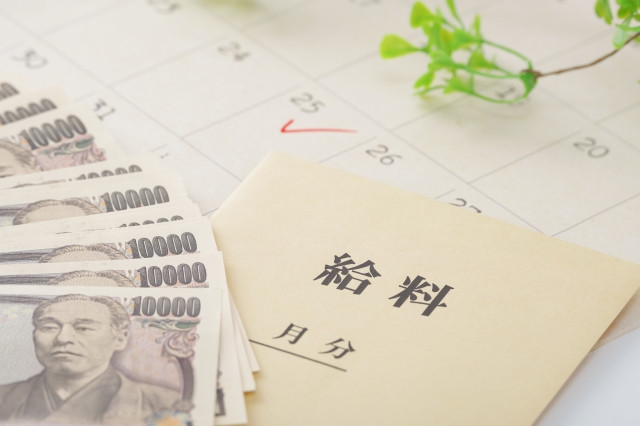An important factor to consider when deciding where to work (whether country or workplace) is “how much can you earn”. For those considering working in Japan, you must be curious about the “average annual income in Japan”, as well as “how much is the average salary in Japan for foreigners”.
In this article, we answer those questions, as well as address important points about salary - “the minimum wage in Japan” which is an important factor that affects salary, and “how to read Japanese salary slips” for when you receive your monthly wages.
First Published: 2022-11-22
Updated: 2024-10-31
Table of Contents
- What is the average annual income in Japan? (2024 latest available)
- What is the average salary in Japan? (2024)
- What is the average salary in Japan for foreigners? (2024)
- What is the minimum wage in Japan? (2024 latest available)
- How to Read Japanese Salary Slips
- Find a Job in Japan with WeXpats
 Are you having any issues with job-hunting in Japan?
Are you having any issues with job-hunting in Japan?
What is the average annual income in Japan? (2024)

Average Annual Income (平均年収, Heikin Nenshuu) consists of basic salary, bonus, overtime allowance, housing allowance etc. payments and allowances but excludes commute expenses and gift payments. The National Tax Agency (NTA) is in charge of releasing results of the average annual income in Japan based on a nationwide survey.
According to the NTA’s latest “Survey on Private-Sector Salary 2023 (令和5年分 民間給与実態統計調査)”, as of December 31st, 2023, the number of salaried workers in Japan was 50.76 million people, and the average annual income in Japan is 4.60 million yen.
By Gender
When broken down by gender, the average salary for men was 5.69 million yen, while women was 3.16 million yen. There is a difference of around 2.53 million yen between men and women.
By Employment Status
When broken down by employment status, full-time workers earn an average annual income of 5.30 million yen (+1.3%), while part-time workers earn an average of 2.02 million yen (+0.7%). There is a difference of around 3.28 million yen between full-time and part-time workers.
Breakdown of Average Annual Income in Japan
The breakdown of the average annual income in Japan is as follows:
- Average Basic Wages and Allowances is 3.88 million yen
- Average Bonus is 710,000 yen
When broken down by gender, the average salary and allowances for men was 4.76 million yen, while women was 2.72 million yen. And the average bonus for men was 920,000 yen, while women was 440,000 yen.
The results show an overall increase in Japan’s average annual income compared to the previous year.
※ National Tax Agency, “令和5年分 民間給与実態統計調査”
Writer's Pick
What is the average salary in Japan? (2024)

Average Salary (平均賃金, Heikin Chingin) consists only of basic salary, excluding bonus, overtime allowance, etc. payment and allowances. The Ministry of Health, Labour and Welfare (MHLW) is in charge of releasing results of the average salary in Japan based on a nationwide survey.
According to the MHLW’s latest “Basic Survey on Wage Structure 2023 (令和5年賃金構造基本統計調査)”, the average salary in Japan for full-time workers is 318,300 yen a month. The average salary in 2023 has increased by 2.1% (6,500 yen) compared to the previous year of 2022. This is the highest recorded in history. Furthermore, the increase of 2.1% compared to the previous year is the highest recorded increase rate since 2001.
There are various reasons for the improvement and increase in average salary, but one likely factor is that the impact of the Coronavirus on the economy has subsided.
What is a “full-time worker” and “part-time worker” in Japan?
We use the term “full-time worker” in this article for easier understanding. However, the actual term used in the survey report is “一般労働者 (Ippan Roudousha)”, i.e. “ordinary worker”.
To differentiate between Work Type (就業形態, Shuugyou Keitai), the survey report uses the terms:
- “一般労働者 (Ippan Roudousha)” for “Ordinary Workers” who work general scheduled working hours (for example, 8 hours a day and 40 hours a week)
- “短時間労働者 (Tanjikan Roudousha)” for “Part-Time Workers” whose scheduled working hours a day or a week are less than ordinary workers
The average salary in Japan in 2023 for part-time workers is 1,412 yen an hour (+3.3% compared to 2022).
By Gender
When broken down by gender, the average salary in Japan in 2023 is 350,900 yen a month for men, and 262,600 yen a month for women. There is a difference of 74,800 yen between men and women.
Compared to the previous year of 2022, the average salary for men has increased by 2.6% (8,900 yen), while women has increased by 1.4% (3,700 yen). Interestingly, in 2021, the roles were reversed, with women experiencing an increase of 2.1% compared to men of 1.4%.
Why the large difference between genders?
In Japan, there is a high tendency for women to leave the workforce to get married, have children, and raise children.
Though the number of women that continue to advance their careers have increased in recent decades, managerial positions (and therefore higher salaries) are still dominated by men. Due to the small number of women in managerial positions, there is a huge gap between the average salary for men and women.
By Educational Background
Breakdown of average salary in Japan in 2023 by highest attained level of education is as follows.
- High School: 281,900 yen a month (+3%*)
- Vocational School: 300,200 yen a month (+2%*)
- Technical College / Junior College: 297,400 yen a month (+1.7%*)
- University: 369,400 yen a month (+1.8%*)
- Graduate School: 476,700 yen a month (+2.7%*)
( * ) indicates increase (+) or decrease (-) from the previous year of 2022
The results show that the higher your educational background, the higher your average salary. Having a higher educational background increases the chance of joining a company that offers a high salary.
Of course, there are many people with low educational backgrounds that receive high salaries as well. It is not uncommon for high school graduates to be recognised for their abilities and achievements. Note that, in Japan, more than 50% of Japanese students go to university, and as for university, the attendance rate rises to over 90%.
For a better understanding of Japan’s higher education system, we recommend reading this article that explains the different types of tertiary education establishments in Japan.
By Age
Breakdown of average salary in Japan in 2023 by age group is as follows.
- Up to 19 Years Old: 190,000 yen a month (+3.1%*)
- 20 ~ 24 Years Old: 224,600 yen a month (+2.8%*)
- 25 ~ 29 Years Old: 258,300 yen a month (+2.8%*)
- 30 ~ 34 Years Old: 286,000 yen a month (+1.8%*)
- 35 ~ 39 Years Old: 314,800 yen a month (+0.7%*)
- 40 ~ 44 Years Old: 338,800 yen a month (+1.5%*)
- 45 ~ 49 Years Old: 355,700 yen a month (+1.9%*)
- 50 ~ 54 Years Old: 371,100 yen a month (+1.8%*)
- 55 ~ 59 Years Old: 376,400 yen a month (+1.7%*)
- 60 ~ 64 Years Old: 305,900 yen a month (+3.5%*)
- 65 ~ 69 Years Old: 269,800 yen a month (+4.7%*)
( * ) indicates increase (+) or decrease (-) from the previous year of 2022
In Japan, the prime working generation is considered to be around the age of 35~59. Looking at the data, you can see that average income rapidly increases as people grow older (and gain more experience). The peak is between the ages of 55 ~ 59 when people tend to hold important positions in companies.
By Company Size
Breakdown of average salary in Japan in 2023 by company size is as follows.
- Large-scale Corporations (1000+ employees): 346,000 yen a month (-0.7%*)
- Medium-scale Corporations (100 ~ 999 employees): 311,400 yen a month (+2.8%*)
- Small-scale Corporations (10 ~ 99 employees): 294,000 yen a month (+3.3%*)
( * ) indicates increase (+) or decrease (-) from the previous year of 2022
Looking at the data, you can see that average income is higher the bigger the company. However, for large-scale corporations, this is the first time in 3 years that the results show a decrease in average income. This is because of the increase in hiring temporary workers across various industries to overcome labour shortages.
※ Nikkei Asia, “変わる働き方、賃金配分に変化 大企業の中堅社員が減少” [2024.03.27]
By Employment Type
When broken down by employment type, the average salary for regular employee is 336,300 yen a month (+2.5%*), and for temporary employee is 226,600 yen a month (+2.4%*).
( * ) indicates increase (+) or decrease (-) from the previous year of 2022
What is a “regular employee” and “temporary employee” in Japan?
To differentiate between Employment Type (雇用形態, Kouyou Keitai), the survey report uses the terms:
- “常用労働者 (Jouyou Roudousha)” for “Regular Employee”
- “Regular Employee” includes (i) workers that are employed for an indefinite period (permanent employees), and (ii) workers that are employed for a fixed period of time that is more than a month
- “臨時労働者 (Rinji Roudousha)” for “Temporary Employee”
- “Temporary Employee” are workers that are employed from day-to-day or for less than a month
※ MHLW, “Basic Survey on Wage Structure - Outline of Survey” (English) ※ MHLW, “令和5年賃金構造基本統計調査 - 概況 ” [2024-03-27] Page 6~12
What is the average salary in Japan for foreigners? (2024)
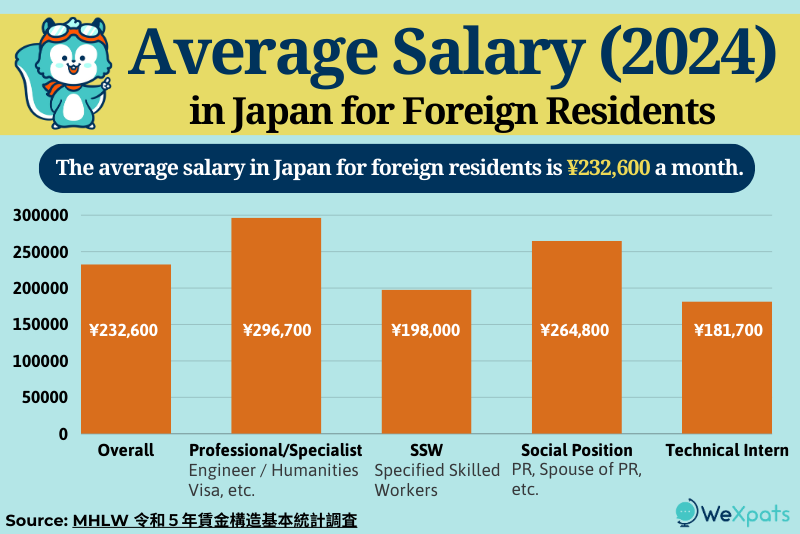
It is also possible to check the average salary in Japan for foreigners in the MHLW’s Basic Survey on Wage Structure.
According to the MHLW’s latest “Basic Survey on Wage Structure 2023 (令和5年賃金構造基本統計調査)”, the average salary in Japan for foreigners in 2023 is 232,600 yen a month. Compared to the average salary in Japan overall which is 318,300 yen a month, the average salary for foreigners is much lower. There is a difference of 85,700 yen.
The main reason for the big difference between average income in Japan overall and foreign workers is the difference in average age and years of service. Foreign workers who come to Japan from overseas to work are often young people in their 30s or younger, often with the aim of advancing their careers, acquiring skills, or earning higher income than in their home countries. Because many people return to their home countries after reaching their goals, the average age of foreign workers is younger and their length of service is shorter than that of Japanese workers.
In Japan, salaries tend to increase as years of service and age increase, creating a difference in average income.
What is the average age and length of service in Japan?
The average age of full-time workers in Japan is 43.9 years old, and their average length of service is 12.4 years. Breaking down by gender, the average age of men is 44.6 years old, and their average length of service is 13.8 years, while the average age of women is 42.6 years old, and their average length of service is 9.9 years.
As for foreign workers in Japan, the average age is 33 years old, and their average length of service is 3.2 years.
By Status of Residence
The average salary in Japan for foreigners by status of residence is as follows.
Professional / Specialist (excluding SSW)
The average salary for the “Professional / Specialist” category is 296,700 yen a month. The following status of residences apply:
Professor / Arts / Religious Activities / Journalism / Highly-Skilled Professional / Business Manager / Legal・Accounting / Medical / Research / Instructor / Engineer・Specialist in Humanities・International Services / Intra-Company Transfer / Nursing Care / Entertainment / Skilled Labour
This category includes “Highly-Skilled Professional” and “Engineer / Humanities” status of residences (visa types) that tend to have higher income. As such, the average salary for this category is the highest among the categories of status of residences.
Specified Skilled Worker (SSW)
The average salary for “Specified Skilled Workers” is 198,000 yen a month. The category includes “SSW (i)” and “SSW (ii)” status of residences (visa types). SSW (i) in particular can only work up to 5 years maximum, making it difficult to get pay raises, promotions and higher positions, and therefore limiting their salary amount. In addition, specified skilled industries have serious labour shortages, and therefore tend to give lower salaries.
Status of Residence Based on Social Position
The average salary for “Status of Residence Based on Social Position” is 264,800 yen a month. There are 4 types of status of residence (visa types) that apply to this category:
Permanent Resident / Spouse of Permanent Resident / Spouse of Japanese National / Long-Term Resident
People with this category of status of residence have lived in Japan for a relatively long time (age and years of service means higher salary), and they have no job restrictions. Therefore, their average salary tends to be higher.
Technical Intern Training
The average salary for “Technical Intern Training” is 181,700 yen a month. The average salary for “Technical Interns” is lower than that of other status of residences (visa types) because they are interns and are learning on the job, which is the entire premise for the Technical Intern Training Programme - to transfer skills to foreigners.
The salary for technical interns tends to be low due to the nature of the programme - for learning. However, the average salary for technical interns has been increasing every year. In 2022, the average salary was 177,800 yen a month, and this year it has increased by 2.2%.
※ MHLW, “令和5年賃金構造基本統計調査 - 概況 ” [2024-03-27] Page 14
What is the minimum wage in Japan? (2024)
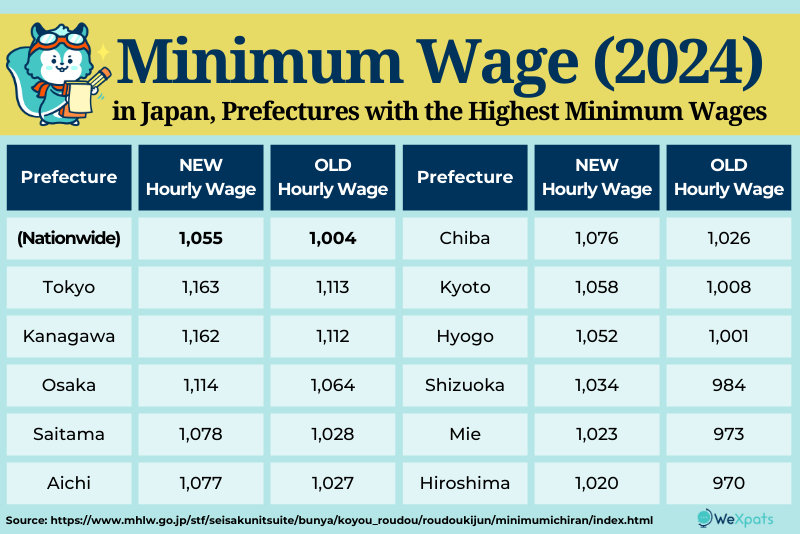
Minimum Wage (最低賃金, Saitei Chingin) in Japan is different for each prefecture (47 prefectures in Japan). The minimum wage is based on Hourly Wage (時給, Jikyuu). The latest minimum wage is available to check on the MHLW’s website.
For those whose salaries are calculated by the hour, usually part-time workers, contract employees and dispatch workers, it is important to know what the minimum wage is.
Latest Minimum Wage in Japan (as of October 2024)
Summary of Important Points:
- Record high rise in minimum wage by 50 Yen.
- The average minimum wage in Japan is 1,055 yen an hour (previously 1,004 yen an hour).
- Tokyo has the highest minimum wage in Japan at 1,163 yen an hour, followed by Kanagawa Prefecture at 1,162 yen an hour.
- Prefectures with minimum wage more than the national average are Tokyo, Kanagawa, Saitama, Chiba, Aichi, Kyoto, and Osaka.
- Prefecture with the lowest minimum wage in Japan is Akita with 951 yen an hour. Previously, it was Iwate with 893 yen an hour.
| Prefecture | NEW Minimum Wage (yen) |
Previous Minimum Wage (yen) |
Prefecture | NEW Minimum Wage (yen) |
Previous Minimum Wage (yen) |
Prefecture | NEW Minimum Wage (yen) |
Previous Minimum Wage (yen) |
|---|---|---|---|---|---|---|---|---|
|
(Nationwide |
1055 | 1004 |
Toyama |
998 | 948 |
Shimane |
962 | 904 |
|
Hokkaido |
1010 | 960 |
Ishikawa |
984 | 933 |
Okayama |
982 | 932 |
|
Aomori |
953 | 898 |
Fukui |
984 | 931 |
Hiroshima |
1020 | 970 |
|
Iwate |
952 | 893 |
Yamanashi |
988 | 938 |
Yamaguchi |
979 | 928 |
|
Miyagi |
973 | 923 |
Nagano |
998 | 948 |
Tokushima |
980 | 896 |
|
Akita |
951 | 897 |
Gifu |
1001 | 950 |
Kagawa |
970 | 918 |
|
Yamagata |
955 | 900 |
Shizuoka |
1034 | 984 |
Ehime |
956 | 897 |
|
Fukushima |
955 | 900 |
Aichi |
1077 | 1027 |
Kochi |
952 | 897 |
|
Ibaraki |
1005 | 953 |
Mie |
1023 | 973 |
Fukuoka |
992 | 941 |
|
Tochigi |
1004 | 954 |
Shiga |
1017 | 967 |
Saga |
956 | 900 |
|
Gunma |
985 | 935 |
Kyoto |
1058 | 1008 |
Nagasaki |
953 | 898 |
|
Saitama |
1078 | 1028 |
Osaka |
1114 | 1064 |
Kumamoto |
952 | 898 |
|
Chiba |
1076 | 1026 |
Hyogo |
1052 | 1001 |
Oita |
954 | 899 |
|
Tokyo |
1163 | 1113 |
Nara |
986 | 936 |
Miyazaki |
952 | 897 |
|
Kanagawa |
1162 | 1112 |
Wakayama |
980 | 929 |
Kagoshima |
953 | 897 |
|
Niigata |
985 | 931 |
Tottori |
957 | 900 |
Okinawa |
952 | 896 |
※ MHLW, “地域別最低賃金の全国一覧” [令和5年度地域別最低賃金改定状況]
How to Read Japanese Salary Slips
![]()
Salary slips or payslips are called「給与明細 kyuuyo meisai」in Japanese. In Japan, payslips are issued on paper or electronically whenever salary is paid. Not only the amount of salary paid, but other information such as amount deducted and number of days worked are written down in detail and separated into many categories, so many people find it difficult to understand their payslip.
In this part, we will explain how to read Japanese salary slips. Note that the format of salary slips may differ from company to company.
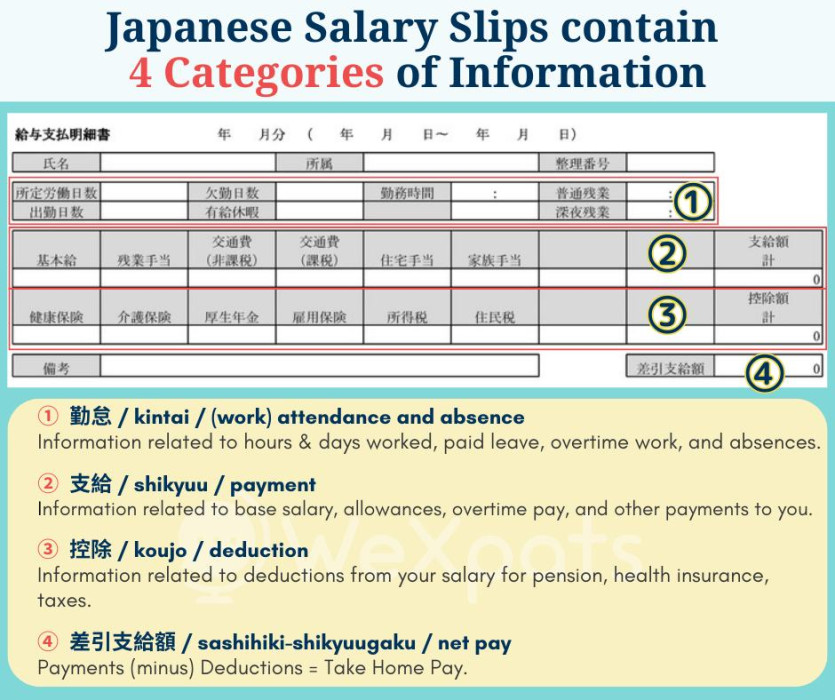
Categories for Days Worked and Overtime
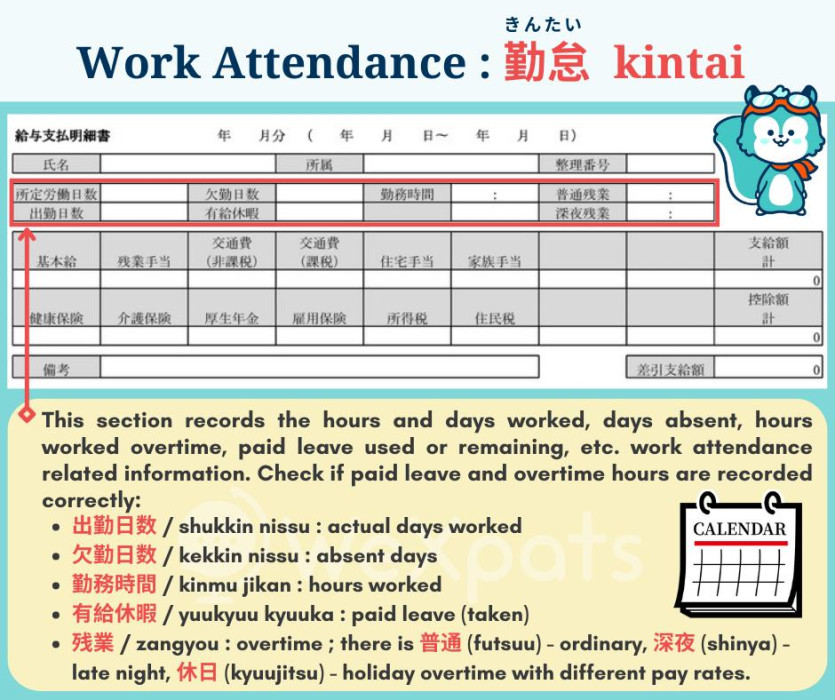
The「勤怠 kintai」section is where the number of days and hours worked, paid leave, absents, etc. are written. Kintai means “attendance and absence” in relation to work.
-
就業日数 / shuugyou nissu / working days : number of working days in the month as determined by the company
-
出勤日数 / shukkin nissu / days worked : number of actual days worked in the month
-
欠勤日数 / kekkin nisuu / days absent : number of days absent in the month (unpaid leave)
-
遅刻日数 / chikoku nissu / days late : number of days late to work in the month
-
早退日数 / soutai nissu / days left early : number of days when left work early in the month
-
有給消化日数 / yuukyuu shouka nissu / paid leave used : number of paid leave taken in the month
-
有給残 / yuukyuu zan / remaining paid leave : remaining number of usable paid leave
-
勤務時間 / kinmu jikan / working hours : number of hours worked in the month
-
普通残業時間 / futsuu zangyou jikan / overtime hours : number of hours of overtime in the month
-
休日出勤時間 / kyuujitsu shukkin jikan / holiday work : number of hours worked on a statutory holiday in the month
[Important] Be sure to check that you have been paid for any overtime done, as well as no deductions for days you took paid leave!
Categories for Salary Payment
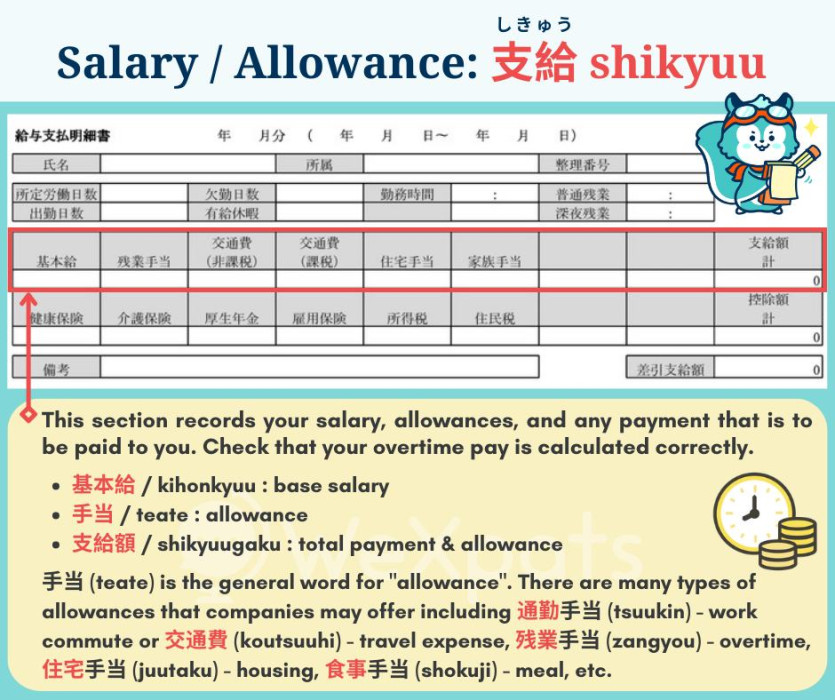
The「支給 shikyuu」section is where the base salary, allowances, overtime, etc. are written. Shikyuu can mean many things in Japanese, including payment, grant and allowance.
-
基本給 / kihonkyuu / base salary : the basic wage paid by the company for the month
-
通勤手当 / tsuukin teate / commute allowance : allowance for commute to work (bus fare, train fare, commute pass, etc.)
-
住宅手当 / juutaku teate / housing allowance : allowance for rent, mortgage, etc.
-
役職手当 / yakushoku teate / executive allowance : allowance for performance of certain roles and responsibilities in the company
-
残業手当 / zangyou teate / overtime pay : pay for overtime work in the month
-
資格手当 / shikaku teate / qualification allowance : allowance for acquiring qualification / certification
-
深夜勤務手当 / shinya kinmu teate / late-night work pay : additional pay for working between 22:00~05:00 of the next day (additional 25% or more of base salary as stipulated by law )
-
法定休日手当 / houtei kyuujitsu teate / statutory holiday pay: additional pay for working on legal holidays (additional 35% or more of base salary as stipulated by law)
The type of allowance provided varies from company to company. In addition to the allowances introduced above, some companies also provide “quit smoking allowance (禁煙手当 kinen teate)” to encourage employees to practise healthy lifestyles, or “meal allowance (食事手当 shokuji teate)” to subsidise lunch expenses.
Categories for Salary Deductions
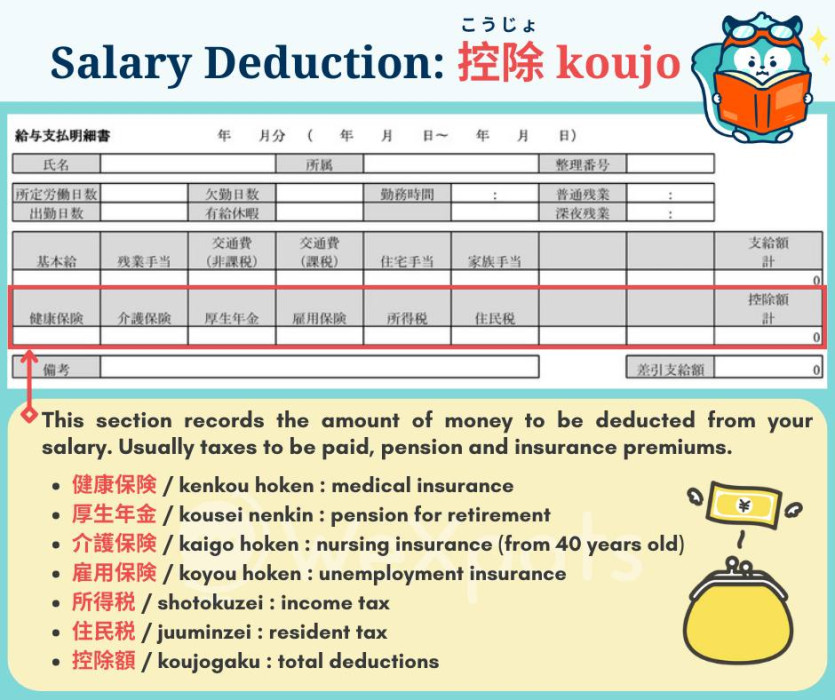
The「控除 koujo」section is where salary deductions are written. In Japan, pension, health insurance premiums, and income taxes are generally deducted from company employees’ salaries. The take-home pay is salary payments after deductions.
-
健康保険 / kenkou hoken / health insurance : insurance payments to receive medical benefits in cases of illness or injury
-
厚生年金 / kousei nenkin / welfare pension : pension contributions for retirement
-
介護保険 / kaigo hoken / nursing insurance : payment to receive long-term care services in the future (applicable for those aged 40 and above)
-
雇用保険 / koyou hoken / unemployment insurance : insurance payments to receive benefits if become unemployed
-
所得税 / shotokuzei / income tax : tax on income
-
住民税 / juuminzei / resident tax : tax to maintain administrative services in the area you live
The amount of deductions depends on the amount of salary received and the previous year’s income.
And finally, your take home-pay, called 差引支給額 (sashihiki shikyuugaku) is calculated as such.
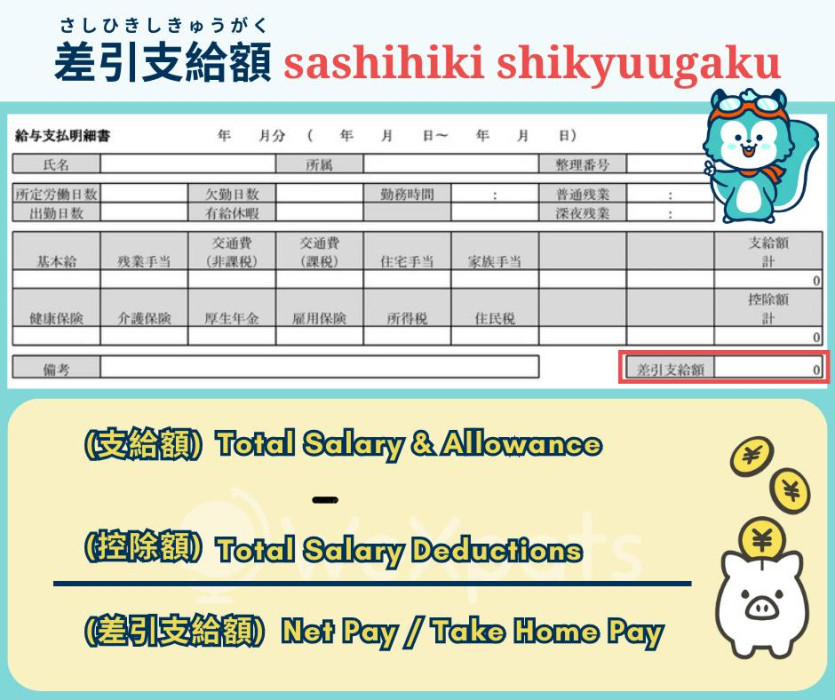
Find a Job in Japan with WeXpats

WeXpats operates a service for foreign nationals who want to work in Japan. There are jobs in a variety of industries. There are 2 services available on WeXpats - WeXpats Agent for full time jobs and WeXpats Jobs for part time jobs.
Looking for a Full Time Position? Leave it to WeXpats Agent!
WeXpats Agent is a career support service that specialises in employment for foreign nationals living in Japan.
Recruitment agencies in Japan are a service where dedicated career advisors will assist you with your job hunt for free. In addition to introducing open positions, we also provide support to help you create your Japanese resume and practice for interviews. Worried about job hunting in Japanese? We are here for you.
Features of WeXpats Agent
-
We have many job openings that are a good fit for foreign nationals to work in, such as translation, interpretation, inbound, etc. jobs that make use of your language skills, as well as engineering etc. jobs that do not require Japanese skills.
-
Our career advisors support and help you prepare your resume and practice job interviews with you. Clearly communicate your strengths to the hiring company.
-
We will handle communication with companies on your behalf, such as arranging interview dates and negotiating conditions. And thereby reducing your stress and time spent.
Finding a Part Time Job? Browse on WeXpats Jobs!

WeXpats Jobs is a part time job site for foreign nationals living in Japan. You can search for jobs in 11 languages (English, Vietnamese, Korean, Indonesian, Traditional Chinese, Simplified Chinese, Burmese, Thai, Spanish, Portuguese), including Japanese. Find jobs that suit you by specifying your Japanese language level, occupation, location, and etc.
※ You can register from outside Japan, but only those living in Japan can apply for jobs.








